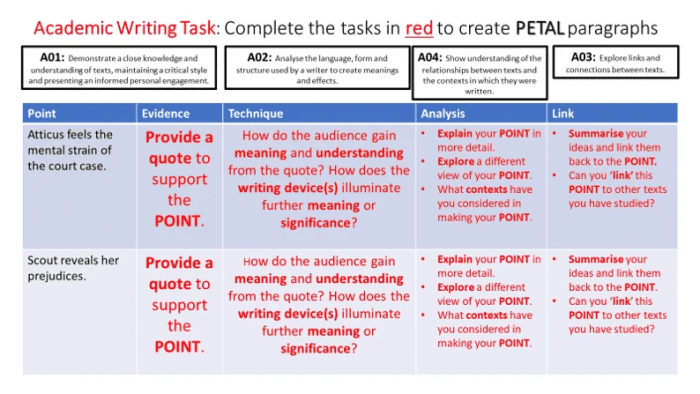As “Lord of the Flies Jeopardy” takes center stage, this opening passage beckons readers into a world crafted with rich insights, promising a reading experience that is both captivating and thought-provoking.
William Golding’s classic novel, “Lord of the Flies,” has captivated generations of readers with its timeless exploration of the human condition. Join us as we delve into the depths of this literary masterpiece, examining its historical context, literary significance, and enduring impact.
Historical Context of Lord of the Flies: Lord Of The Flies Jeopardy
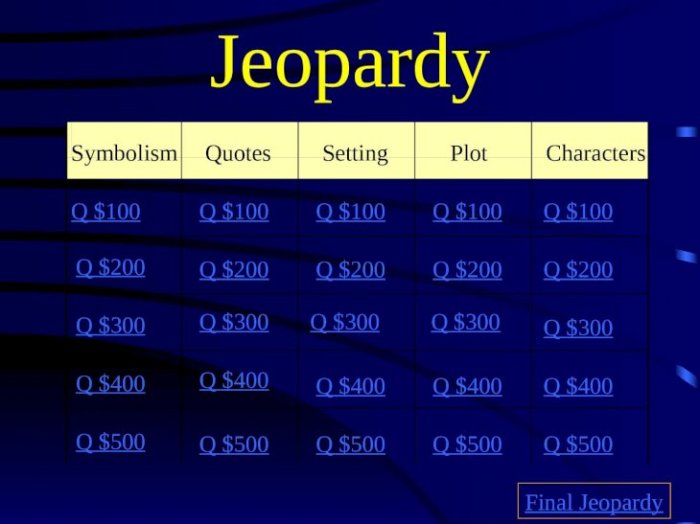
William Golding’s seminal novel, Lord of the Flies, was published in 1954, amidst a period of significant historical and cultural change.
The novel’s backdrop was the aftermath of World War II, which had left a profound sense of disillusionment and cynicism. Golding, a former naval officer, drew upon his wartime experiences to explore the darker aspects of human nature.
Allegory of Human Nature
Lord of the Fliesis widely considered an allegory of human nature. The novel depicts a group of British boys who are stranded on a deserted island after their plane crashes. Initially, the boys attempt to establish a civilized society, but they soon succumb to their primal instincts and descend into savagery.
- The novel explores themes of power, violence, and the struggle between good and evil.
- It serves as a cautionary tale about the fragility of civilization and the ease with which it can collapse.
Lord of the Flies as a Literary Classic
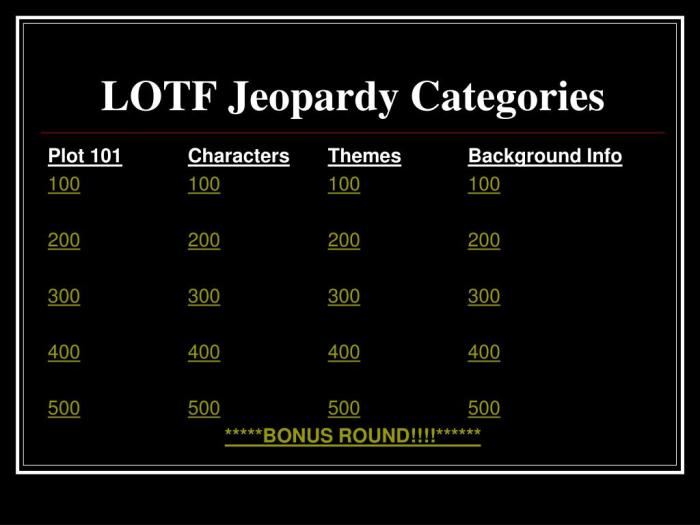
Lord of the Flies has established itself as a timeless literary masterpiece, captivating generations of readers with its profound exploration of human nature and the fragility of civilization. Its enduring appeal lies in its masterful storytelling, compelling characters, and insightful commentary on the complexities of human behavior.The
novel’s allegorical nature invites readers to contemplate the darker aspects of human nature, the struggle between good and evil, and the dangers of unchecked power. Its symbolic elements, such as the island, the conch, and the pig’s head, provide a rich tapestry of meaning that encourages deep contemplation and analysis.
Literary Merit
Lord of the Flies is widely regarded as a seminal work in modern literature, praised for its skillful prose, vivid imagery, and profound insights into human nature. William Golding’s masterful storytelling weaves a gripping tale that captivates readers from beginning to end, while his nuanced characterization allows readers to empathize with even the most flawed characters.The
novel’s exploration of universal themes and its timeless relevance have made it a staple of literary study. Its insights into the human condition continue to resonate with readers of all ages, solidifying its status as a literary classic that transcends time and cultural boundaries.
Characters and their Roles
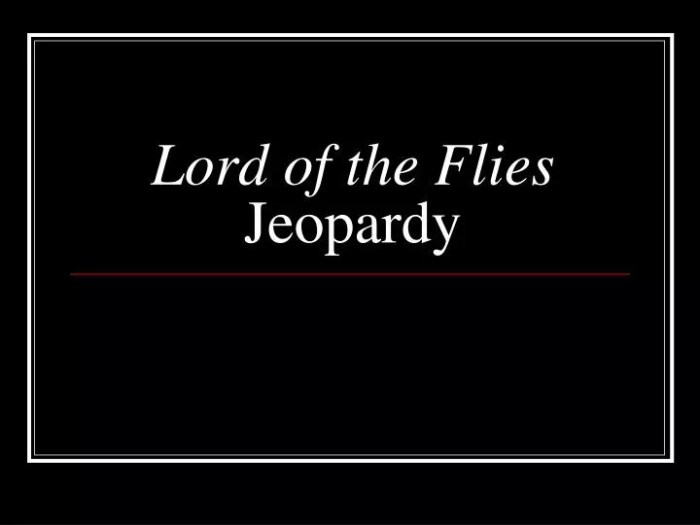
Lord of the Fliesfeatures a diverse cast of characters who play pivotal roles in shaping the novel’s narrative. Their motivations and character development drive the plot and explore the themes of civilization and savagery.
Ralph
Ralph is the elected leader of the boys on the island. He represents order, reason, and the hope of maintaining civilization. Ralph’s leadership is challenged by Jack, who embodies the primal instincts and the allure of savagery.
Piggy
Piggy is Ralph’s loyal companion and intellectual counterpart. He is overweight, asthmatic, and wears glasses, which make him a target for the other boys’ mockery. Despite his physical limitations, Piggy’s intelligence and common sense make him a valuable asset to Ralph.
Jack
Jack is the leader of the hunters and represents the darker side of human nature. He is charismatic, athletic, and driven by a lust for power. Jack’s savagery and lack of empathy lead him to clash with Ralph and the other boys who value civilization.
Simon
Simon is a solitary and enigmatic figure who represents spiritual insight and the ability to see beyond the surface. He has a deep understanding of the boys’ inner struggles and the dangers they face on the island.
Other Key Figures
Other notable characters in the novel include Roger, a cruel and sadistic bully; Maurice, a follower of Jack who later turns against him; and Piggy’s cousin, Percival, a timid and unassuming boy who is often overlooked.
Themes and Symbolism
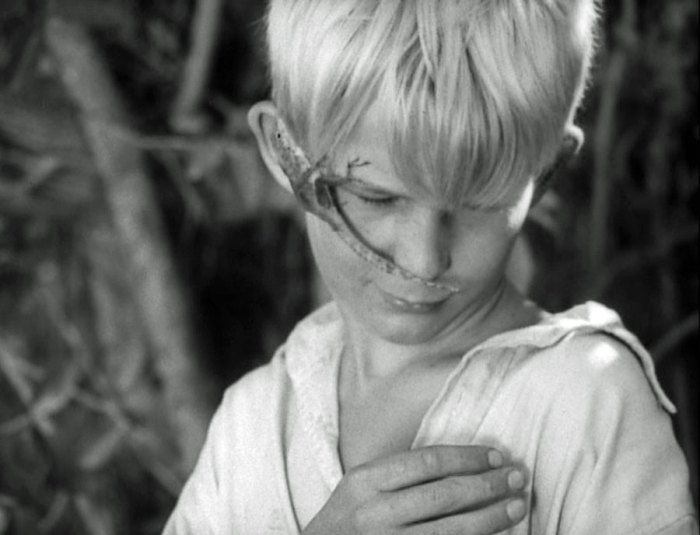
Lord of the Flies explores profound themes that delve into the human condition. It juxtaposes civilization against savagery, innocence against corruption, and examines the inherent nature of humanity.
Symbolism
The novel employs powerful symbols to convey its themes. The conch shell represents order and civilization, yet it is shattered, symbolizing the loss of hope and the descent into chaos. The island itself is a microcosm of the world, isolated from the constraints of society, where the boys’ true nature is revealed.
The Lord of the Flies, a grotesque pig’s head, embodies the primal instincts and savagery that lurk within all humans. It represents the dark forces that can corrupt even the most innocent of hearts.
Adaptations and Interpretations
Lord of the Flies has been adapted into numerous films, television shows, and stage plays. These adaptations have interpreted and influenced the novel’s themes and characters in various ways.
If you’re a whiz at “Lord of the Flies” trivia, then you might want to test your knowledge on the unit 7 AP Psychology test . You’ll need to know the ins and outs of the novel, from the characters to the themes.
But don’t worry, even if you’re not a literary expert, you can still have a blast playing “Lord of the Flies” Jeopardy.
Film Adaptations
- The 1963 film adaptation directed by Peter Brook is considered a classic and is widely praised for its faithfulness to the novel.
- The 1990 film adaptation directed by Harry Hook is a more stylized and updated version of the novel that emphasizes the novel’s themes of savagery and violence.
Television Adaptations, Lord of the flies jeopardy
- A 2006 television adaptation by BBC was a two-part miniseries that stayed close to the novel’s plot and characters.
- A 2018 television adaptation by FX was a more radical retelling of the novel that updated the setting and changed some of the characters.
Stage Adaptations
- There have been numerous stage adaptations of Lord of the Flies, including a 1962 adaptation by William Golding himself.
- These adaptations have often been used to explore the novel’s themes of power, violence, and morality.
Educational Value
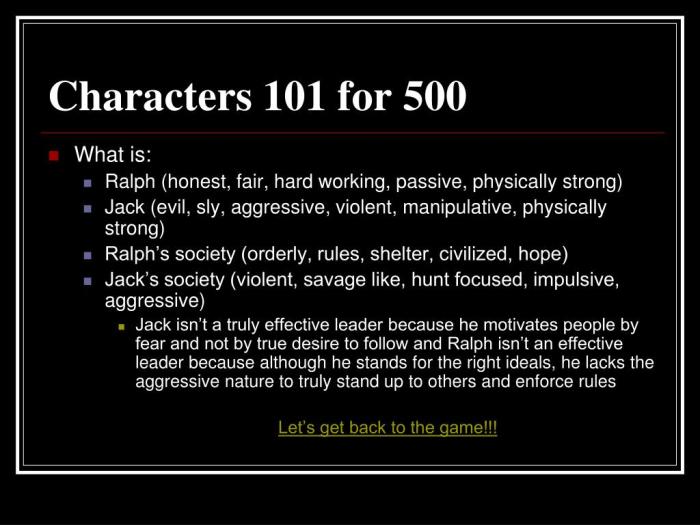
Lord of the Flies offers a valuable educational experience by exploring the complexities of human nature and social dynamics. Its relevance extends to contemporary society, where understanding these concepts is crucial for navigating social interactions and fostering harmonious relationships.
In classrooms, the novel can be used to facilitate discussions on the following themes:
Social Dynamics
- The impact of power structures on individuals and groups.
- The role of conformity and peer pressure in shaping behavior.
- The dynamics of groupthink and its potential consequences.
Human Nature
- The inherent duality of human nature, capable of both good and evil.
- The influence of fear and self-preservation on human actions.
- The importance of education and moral guidance in shaping human behavior.
Moral Dilemmas
- The conflict between individual desires and societal norms.
- The ethical implications of violence and aggression.
- The responsibility of individuals to stand up for what is right.
Cultural Impact and Legacy
Lord of the Flies has had a profound impact on popular culture, leaving an enduring legacy that continues to shape our perceptions of childhood, adolescence, and the human condition.
The novel’s depiction of the descent into savagery and the loss of innocence has resonated with generations of readers, inspiring countless works of art, literature, and film. Its themes of power, morality, and the fragility of civilization have made it a touchstone for discussions about the nature of humanity.
Influence on Literature and Film
Lord of the Flies has been adapted into numerous films, television shows, and stage productions, each interpretation bringing its unique perspective to the story. Notable adaptations include the 1963 film directed by Peter Brook, the 1990 film directed by Harry Hook, and the 2006 film directed by John Polson.
The novel’s influence is also evident in countless other works of literature, from Margaret Atwood’s “The Handmaid’s Tale” to Suzanne Collins’ “The Hunger Games.” Its themes and characters have been referenced and reimagined in a wide range of genres, including science fiction, fantasy, and horror.
Societal Impact
Beyond its impact on popular culture, Lord of the Flies has also had a significant impact on societal perceptions of childhood, adolescence, and the human condition. The novel’s depiction of the fragility of civilization has led to a greater awareness of the potential for violence and chaos lurking beneath the surface of society.
It has also raised questions about the nature of human nature and the role of education and socialization in shaping our behavior. Lord of the Flies has become a staple of school curricula around the world, sparking discussions about morality, ethics, and the importance of cooperation.
Question & Answer Hub
What is the central conflict in “Lord of the Flies”?
The central conflict revolves around the struggle between civilization and savagery as a group of boys stranded on a deserted island grapple with the absence of adult authority.
How does the novel explore the theme of innocence and corruption?
Golding portrays the initial innocence of the boys, gradually corrupted by fear, power struggles, and the primal instincts of savagery.
What is the significance of the conch shell in the novel?
The conch symbolizes order, civilization, and the hope of maintaining a semblance of society amidst chaos.
